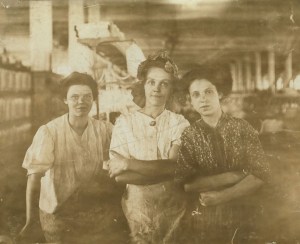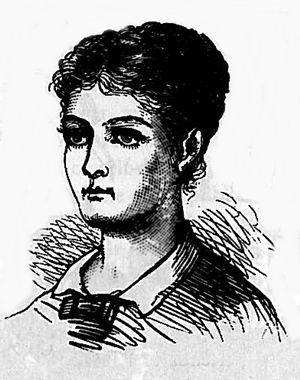
What was it like to be a nineteenth century woman who bucked the system?
Suppose she didn’t want to marry right away but instead, preferred to seek independence and meaning through work?
What if her world didn’t revolve around a man, but herself? How would she fare?
Does the answer lie in Jo March?
 At first, readers thought that Jo March from Louisa May Alcott’s classic, Little Women, would provide answers to these questions. After all, Jo was fiery and independent, determined to make her mark in the world:
At first, readers thought that Jo March from Louisa May Alcott’s classic, Little Women, would provide answers to these questions. After all, Jo was fiery and independent, determined to make her mark in the world:
“I want to do something splendid before I go into my castle, something heroic or wonderful that won’t be forgotten after I’m dead. I don’t know what, but I’m on the watch for it, and mean to astonish you all some day. I think I shall write books, and get rich and famous, that would suit me, so that is my favorite dream.” (from Chapter 13, Little Women, “Castles in the Air”)
Would Jo break the mold of the nineteenth century girl?
Or was it all just a tease?
Little Women was a book for girls and pressure to “marry Jo off’ forced Louisa to compromise her vision of Jo as a literary spinster to please her public, and her publisher.
The compromise was shared however: Jo married an unconventional husband in Professor Bhaer and the two enjoyed marriage based on love, companionship and the shared work of the school at Plumfield.
A grown-up approach
 An adult treatment of womanly work and independence was needed to take the essence of Jo a step further.
An adult treatment of womanly work and independence was needed to take the essence of Jo a step further.
Enter Christie Devon, the heroine of Work A Story of Experience, Louisa’s semi-autobiographical account in adult form.
In the Penguin Classics version of Work, Joy S. Kasson writes in the introduction, “Work … illuminates the issue of women’s work and the struggle for success – both on a personal level for Alcott and on a more general level for American culture in the years immediately following the Civil War.”(pg. xii)
Written over several years
Begun in 1861 and not completed until 1872, it was originally released in serial form in The Christian Union (published by Harriet Beecher Stowe’s brother Henry Ward Beecher) and appeared in novel form the following year.
Author in demand
According to biographer Martha Saxton, after The Christian Union made a handsome offer to publish Work as a novel after its serialization, Louisa nearly jumped ship from her current publisher, Roberts Bros. because she was “fed up with [Thomas] Niles’s cheapness.” Niles wooed her back after he “bombarded her with frantic letters” (pg. 350, Louisa May A Modern Biography by Martha Saxton).

The structure of Work
The first six chapters are episodic in nature (like Little Women); Louisa wrote them in the early 1860s when she was in her twenties, struggling for work in Boston.
After putting the manuscript away for awhile, she returned to it, transforming the story into a full-blown narrative.
Evolving story
It is here that the book really begins, with a “more complex and ambiguous exploration of the deeper meanings of work, not as ‘employment’ alone but as spiritual sustenance.” (Sasson, pg. xv, introduction to Work).
The nice, neat package that was the first six chapters now becomes more ambivalent; the black-and-white turns to gray, the book matures.
Fleshed-out heroine
Alcott scholar Sarah Elbert describes Christie as Alcott’s “most complex and sustained heroine.” (pg. 192, Critical Essays on Louisa May Alcott edited by Madeleine B. Stern – “Introduction to Work: A Story of Experience” by Sarah Elbert).
I look forward to getting to know Christie and discussing her with you!
Click here to read part two of this series on Work.
![]() Reading Work by Louisa May Alcott is part of my Louisa May Alcott Summer Challenge – are you a part of this challenge and if so, how are you doing?
Reading Work by Louisa May Alcott is part of my Louisa May Alcott Summer Challenge – are you a part of this challenge and if so, how are you doing?
 Click to Tweet & Share: Work: Louisa May Alcott bucks the system http://wp.me/p125Rp-13C
Click to Tweet & Share: Work: Louisa May Alcott bucks the system http://wp.me/p125Rp-13C
![]() Are you passionate about Louisa May Alcott too?
Are you passionate about Louisa May Alcott too?
Send an email to louisamayalcottismypassion@gmail.com
to subscribe, and never miss a post!
Facebook Louisa May Alcott is My Passion
More About Louisa on Twitter
![]() Susan’s ebook, “Game Changer” is now available From the Garret – download for free!
Susan’s ebook, “Game Changer” is now available From the Garret – download for free!


I am glad you are discussing this book, which I found much more interesting that Alcott’s other full-length adult novel, Moods. The first 6 chapters are episodic, as you say, and also based on Alcott’s own experiences as she wrote, taught, sewed, dreamed of being a paid (as opposed to amateur) actress, and even went out as a servant.
These chapters really emphasized to me how few choices 19th-century women had. And yet women worked. On the farm they did nothing but work, although it did not get any such label or bring in a salary. These were the times when people were leaving the farm and the work place shifted. Alcott puts this in terms of character as much as economics:
“Christie was one of that large class of women who, moderately endowed with talents, earnest and true-hearted, are driven by necessity, temperament, or principle out into the world to find support, happiness, and homes for themselves.”
What about the factory girl, serving the new machines which brought industry to New England? It’s also a fascinating story, but one that Alcott does not tell. I will be posting soon on Pietra Rivoli’s The Travels of a T-Shirt in the Global Economy, which explains why young women still leave the farm and go to work all around the world.
Totally agree about Moods, I had a hard time getting through it. I’m finding Work fascinating not just because of the commentary about the plight of women who chose not to marry but rather to work but also because it is such a window into Louisa’s own mind and heart.
I’ve come to feel that Louisa’s true feminist message was not so much about power or women prevailing over men in a power struggle, but more about autonomy – allowing women to discover who they are and what they can do, on their own. Louisa felt that this could be accomplished through the traditional avenues of marriage and family (so long as the couple married for love and shared an equal partnership – both outside the norm for the day, and exactly what Jo and Professor Bhaer represented) and she very much promoted the sanctity of the family in true Bronson Alcott style (one of the best legacies he left). But she also felt it was perfectly proper for a woman to be single and pursue meaningful work, as she did (although it wasn’t always a comfortable fit for Louisa as she needed to justify it by saying she had to support her family).
I’m consulting several biographies and commentaries regarding Work and can’t always pinpoint where I found something (very annoying – wish my brain were a Google search engine!) but I do recall reading that Louisa felt that factory work was beneath her (the May family snob factor? :-)) and therefore didn’t employ Christie that way. She also hated teaching and wouldn’t submit Christie to that profession either.
Hmm, along the lines of factory work being beneath her, was it because that’s what immigrants did? It wasn’t considered ladies work while being a companion and sewing was.
I read the book in high school, and i barely remember it. I should give it another go round, although I am up to my eyeballs in unread books. 🙂
Regarding factory work, I’m willing to bet you’re correct. Louisa was not shy in her disdain for the Irish especially. Funny how she could be so passionate about rights of slaves but could be so prejudiced against the Irish and Catholicism. I admit I don’t know enough about the whole situation with the Irish immigrants to understand why people were so vehemently against them (though as a Catholic, I do understand how all the rituals and rules, and the mass being in Latin could be so foreign to Puritan Protestants – it’s probably not unlike how I felt the first time I stepped inside an Eastern Catholic church which is Byzantine in its rituals – very foreign and very hard to relate to – used to it now because my husband is a deacon in that church! :-))
Go back and skim Work, please, would love your comments, they’re always right on target (yes, I’m trying to flatter you into it! :-))
That’s typical though for the time.
I always found it interesting that people always assumed that everyone was ready to rattle their sabers when it came to slavery. But the reality was a minority in the North really felt that way. If you were a poor factory worker or a farmer trying to survive you didn’t really care about a slave’s plight. You were more concerned with your own. But, is it any different today? The more things change….
You always nail things so! You’re right. The Alcotts were the exception – they too were very poor but their inner lives were rich because they placed such a high priority on cultivating them and that’s probably why there was room to feel the plight of slaves. It’s too bad it couldn’t translate to the Irish.
It does make me more curious now as to what the deal was with the Irish. Something new to pursue seeing that I come from Irish Catholic as well as English-Brahmin stock. Quite a combination!
Incidentally, speaking of a rich inner life, until a couple of days ago I thought there was something wrong in cultivating one too much, like it was being self-absorbed. Louisa is teaching me that cultivating a rich inner life is not only good, but necessary.
I just found your blog. Louisa May Alcott is my personal hero. I’ve been to Orchard House a few times, and many times just for Christmas shopping. Last fall, our state public libraries had Louisa May Alcott programs. One retired professor spoke on Work and Louisa May Alcott and feminism. I should have taken notes but I didn’t. I had the pleasure of meeting Louisa herself at her birthday party which concluded the LMA events at the library. I look forward to exploring your blog in more depth soon.
Which library are you affiliated with? I followed that ALA initiative closely. Harriet Reisen knew of my blog and my interest and was kind enough to invite me to attend the kickoff workshop for the initiative in Boston – were you there? How lucky you were to have that program at your library!
Orchard House is beginning to feel like home to me! 🙂 Beautiful at Christmastime.
Thanks for stopping by!
Thanks, and welcome!